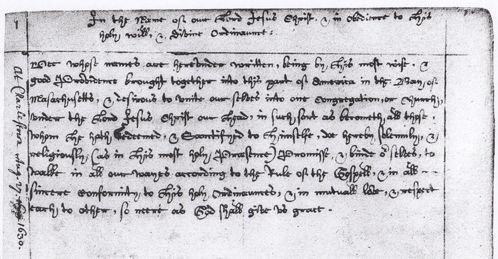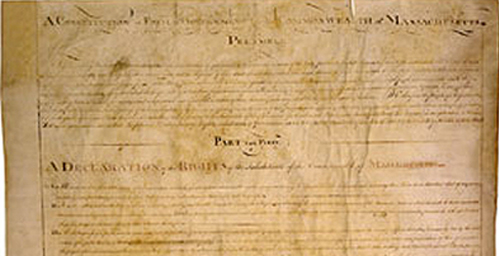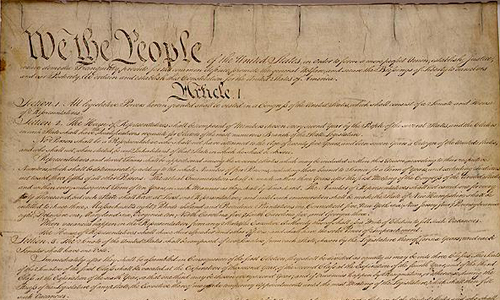Covenantal Intent in Constitutional Language
When the people, rather than a higher authority, frame the ordinances by which they will govern themselves — a new concept in the seventeenth century — it is of interest to compare the language of intent of earlier documents with later ones. The Covenant of the First Church in Boston lives on in spirit within the Preamble of the Constitution of the Commonwealth of Massachusetts and the Constitution of the United States.
In 1629, the Massachusetts Bay Company received a Royal Charter of incorporation granted to the ‘Governor and Company of the Massachusetts Bay in Newe England’ from King Charles I of England. One paragraph of the Mass Bay Charter gives it a status exceptional to that of the Virginia Colony and other charters. This was the paragraph permitting the transfer of the meeting place and officers of the Company from England to the New World. Rather than leaving the Charter behind with a group of investors in London, Governor Winthrop and the Massachusetts Bay Company brought their charter with them to the New World.
The essentials of the Charter created a government by the formation of a General Court by vote of all the freemen, or stockholders, giving them the right to elect the Governor, the Deputy Governor and the Court of Assistants. Upon arriving in America, however, the first order of business of the Mass Bay Colonists was to draw up and sign a church covenant, a morally binding contract, pledging loyalty to one another.
The preambles of the constitutions of the Commonwealth of Massachusetts [the oldest such continuing document extant] and that of the United States government echo the covenantal desire to voluntarily ‘bind ourselves, each to other, in mutual love and respect...’ It is the swearing of an oath of trust in one another. A comparison of the language illuminates the sense of this pledge undergirding all three documents:

Covenant of the First Church in Boston, 1630: ‘Wee whose names are hereunder written, and desirous to unite ourselves into one Congregation...doe hereby solemnly Promisse, and bind our selves, to walke in all our wayes...in mutuall love, and respect each to other...’

The Massachusetts Constitution, 1780: ‘We, the people... acknowledging an opportunity [of] entering into...[a] solemn compact with each other...[here sign]a social compact, by which the whole people covenants with each Citizen, and each Citizen with the whole people, that all shall be governed by certain Laws for the common good...’

The United States Constitution, 1787: ‘We, the people of the United States, in order to form a more perfect union...insure domestic Tranquility...[and] promote the general Welfare...do ordain and establish this Constitution...And for its support [by a declaration of independence], we mutually pledge to each other our lives, our fortunes, and our sacred honor.’
Sources and further reading: Boyer (2001).
The names of the first signers of the FCB covenant:
